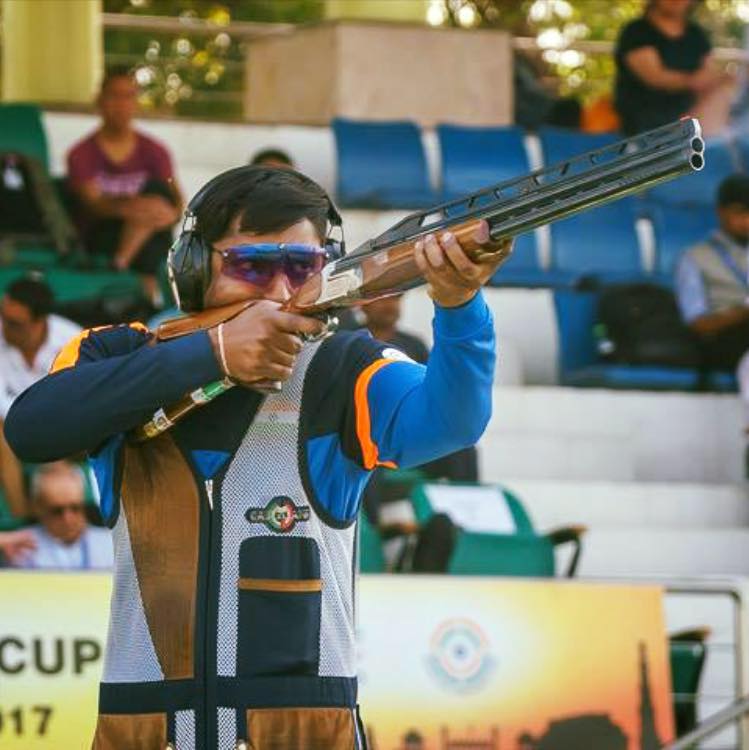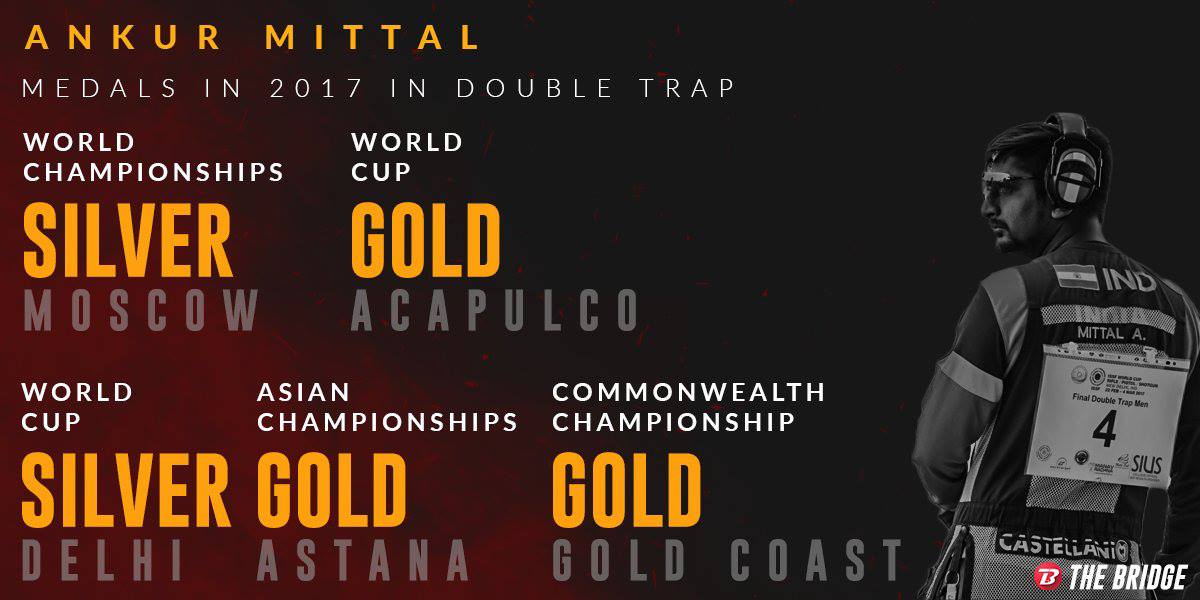Featured
Ankur Mittal and life beyond Double Trap shooting

He has a vivid memory of that day-the day Indian shooting finally got an idol to look up to. No, we aren't talking about Abhinav Bindra and his Beijing triumph, but the one before that. The day Rajyavardhan Singh Rathore stood on the podium with an Olympic silver medal around his neck.
Ankur Mittal was 12 and was glued to the TV at home when Rathore was busy blasting clay targets into pieces at the shooting range in Athens. 'I still remember that day. I was a kid,' says Ankur, who, today, is much older, wiser and accomplished," Ankur Mittal, who is much older and wiser today, told The Bridge
 Source: Ankur Mittal/Facebook
Source: Ankur Mittal/Facebook 'Col. Rathore has been our family friend. My dad used to shoot with him. I remember him coming home during my younger days. So, seeing him on TV winning that (Olympic) medal was great."
"Back then I didn't know he was the first Indian shooter to win an Olympic medal. Once he returned, he was a constant on news channels and newspapers. I wanted to be like him. I was in, I guess, seventh or eighth standard when Athens (Olympics) happened. So, for a kid, all the fanfare that followed, seeing that up close made me want to be like him.'
From badminton to shooting
Back then, Ankur didn't know how far he would go in his pursuit of excellence. Though he belonged to a family where Shooting was a norm ' his father Ashok Mittal, is a shooting enthusiast and his elder brother Ajay is a National Championship and Junior Asian Championship titleholder ' it was not until he turned 16 that his dad let him take the gun.
'Nowadays you see kids who are 12 and 13 competing in the junior category. I don't know when they would have started if they are to compete at such young age,' he says.
'For me, it was not until I was 16-17 that my dad let me get close to a gun. I would continue with badminton then. We used to play in school and the school used to send us for various competitions. But nothing serious.
"Dad used to shoot but as a hobby, but never professionally. My brother learnt the art from him and I had both of them to teach me. I think when you have someone to guide in the family, you do well.'
But once he started aiming the clay disks flung in the air at high speed, there was no stopping this young man from Haryana. After a series of impressive performances early in his career, it was last year that Ankur stole the limelight from the much-established athletes of the Indian shooting fraternity.
A memorable year for Ankur Mittal
The 25-year-old began 2017 with a silver medal at the ISSF World Cup in his own backyard, the Dr Karni Singh Shooting Range in New Delhi and then went on to better his performance with a gold at the ISSF World Cup in Acapulco, Mexico. His performance at the Club de Caza also won him accolades for equaling the world record. Ankur would match the world mark set by James Willet, managing 75 hits in the final ' the same as his Australian rival.
Also read: 'I do not want my students to go through what I did during my time as an Olympian"And just when everyone would think the Haryana shooter was all done for the season, he would go on to reclaim his double trap gold at the Asian Shotgun Championships before capping off a fine year with a silver at the World Championships in Moscow, Russia. 'I am very pleased with the results I got last year,' says the former world number one in double trap.
'In the shotgun category, I don't think anyone from India ever enjoyed a season like I did last year. Winning so many medals definitely helped me improve my game. 2017 was the last year when double trap saw the best of the best competing at the biggest stage."

"This year (2018), many nations have withdrawn from double trap since it's not in the Olympic programme. And I am happy that I was among the medals when the field was the strongest.'
He adds, 'But I don't want to be known for that one season I had. I am looking forward to this season and hopefully, I can continue the good run. It's a very crucial year for me. This is the last time I would be shooting double trap and I want to end on a high."
"Commonwealth Games is not that big in terms of the shooters who will turn up. I don't think many of the top shooters will be in Australia. But there is pressure going into the Commonwealth Games. I am looking at the Asian Games and preparing accordingly. That's where the real challenge lies.'
Life beyond Double Trap
2017, however, wasn't all happy and merry for Ankur. Though he went all guns blazing, winning medals at will, the decision by ISSF executive committee and administrative council to drop double trap from its Olympics programme means this Indian shooter will have to master another shotgun discipline if he has to live his 'Olympic dream'.
'It's really disappointing. It's not just because I can't shoot double trap at the Olympics, but moreover, because the effort that I have put in and the time that I gave to this discipline over the past 7-8 years won't give me anything now. One decision and that's changed everything for me. That's what hurts the most,' he says.
'But I can't afford to cry over that. That's not changing anything. I have to take this decision in my stride and try to find a place for myself somewhere else. Many shooters across the world have already moved on and are trying their hand at trap or skeet. Some of them even made to their respective national teams. I see that as an encouraging sign. It won't be easy, but that doesn't mean it's not possible. I have to give my best and then let's see how things pan out.'
Given his past, there's no surprise that Ankur has preferred to switch to trap shooting post-Asian Games. When Ankur started, he was predominantly a trap shooter. He continued shooting trap at the national level until 2012, even winning the bronze at the junior nationals the same year. However, the fact that he had won gold in the double trap and went on to become part of a senior team that featured Ronjan Sodhi and Rathore, soon made him concentrate on the twin targets.
But Ankur doesn't think one can assess him based on what he had achieved during his junior days. 'I don't think you can compare your junior performance to what you will be when you shoot at the senior level,' he says.
'Things are very different at this level. I was just starting then. It didn't matter how well I did then because I always had time to come back and be stronger. But now things are different. The Trap team we have is really strong. Getting into that side will be my first challenge. Let's see how that goes.'
Though the ISSF decision has ruled double trap out of the World Cup events this year, it still holds on to its place at the Commonwealth Games and Asian Games, an event where Ankur is keen to win a medal at. But with the Asiad set to end only by September, Ankur is a little concerned about the lack of time before the new season can kick-off. 'Obviously things will be difficult. The Asian Games finish only in September and then in December, we will have the selection trials for the following season. So, I barely have two months to be good at Trap. But if I have to be there, I have to do it,' he states.
With his eyes firmly set on the Commonwealth Games and Asian Games before he makes the switch to trap, one can only hope that the Haryana lad will be as good at the single-target event as he was while cracking the twin birds.

